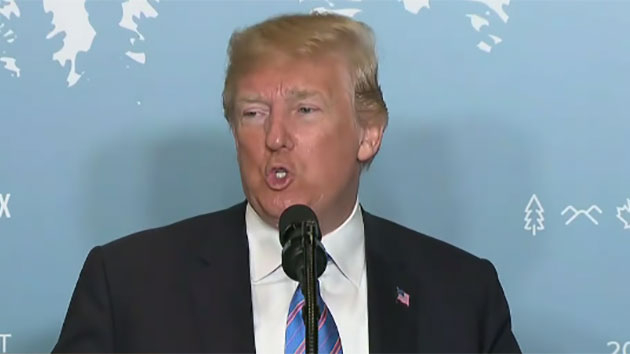Trump discusses immigration strategy with House GOP amid family separation uproar
 ABC News(WASHINGTON) — President Trump arrived on Capitol Hill Tuesday evening to discuss immigration strategy with House Republicans as lawmakers struggle to respond to the national uproar over the administration’s policy causing family separations at the border.
ABC News(WASHINGTON) — President Trump arrived on Capitol Hill Tuesday evening to discuss immigration strategy with House Republicans as lawmakers struggle to respond to the national uproar over the administration’s policy causing family separations at the border.
The president declined to answer shouted questions about the new practice as he entered the Capitol but did make a statement about the immigration system in general.
“The system has been broken for many years, the immigration system. It’s been a really bad, bad system, probably the worst anywhere in the world. We’re going to try to see if we can fix it,” he said before entering House Speaker Paul Ryan’s office.
A few minutes later, he emerged with Ryan and walked with him into the House basement, where that chamber’s Republican conference was awaiting him. He flashed a thumbs up at reporters as he walked to the meeting room.
Republicans hope Trump will express his support for two Republican proposals addressing border security and the legal status of young undocumented immigrants known as “Dreamers” – which will now include provisions addressing family separations, according to a senior GOP leadership aide.
House Judiciary Committee Chairman Bob Goodlatte’s bill, the Securing America’s Future Act, provides a pathway to legal status for Dreamers while limiting legal immigration levels. Considered the more conservative of the two bills, it isn’t expected to pass the House with Republican votes given Democrats’ opposition, as well as concerns from some moderates.
Leadership, after facilitating talks with GOP conservatives and moderates, has pushed alternate legislation that would offer a compromise to moderates who threatened to force a vote on legal status for recipients of the Deferred Action for Childhood Arrivals (DACA) executive action under President Obama. This measure would provide $25 billion in border wall funding, eliminate several visa programs while restructuring others, and provide a pathway for six-year “indefinitely renewable” legal status for Dreamers who could later apply for citizenship. It is also expected to include a provision to prevent the government from separating young children from parents and guardians while in government custody.
The bill would require the Department of Homeland Security to house families together while parents go through criminal proceedings for the misdemeanor of first-time illegal border crossing – a change from current practice requiring the Department of Justice to take criminal custody during criminal proceedings, thus leading to family separation.
The proposal would also eliminate the 20-day cap on DHS administrative custody for accompanied children, so families would be kept together in the custody of DHS throughout criminal proceedings. It also authorizes up to $7 billion for family residential centers, ensuring DHS has access to funds to house more families.
In the cases of repeat offenders or other serious criminals, children would be placed in the care and custody of the Department of Health and Human Services.
The legislation is not finalized but an updated version is expected to be circulated among lawmakers later Tuesday in advance of the conference meeting with the president Tuesday evening.
Both bills have yet to be introduced, meaning they could still be tweaked after the meeting with Trump.
Republican leaders are expected to whip, or gauge support, for the ideas during a vote series Tuesday night following the president’s 5:30 p.m. closed-door appearance at the Capitol.
Complicating the effort even further, Trump announced Tuesday that he will make his own changes to the House immigration bill after he reviews the emerging text. His surprise comments come after a whirlwind Friday when Trump told reporters he wouldn’t support the GOP compromise bill, only to be contradicted by the White House in a statement nine hours later pledging support for either option.
“We have a House that’s getting ready to finalize an immigration package that they’re going to brief me on later and then I’m going to make changes to,” Trump told the National Federation of Independent Businesses on Tuesday. “We have one chance to get it right.”
Trump has also maintained he does not have the power to take executive action and has repeatedly put the onus on Congress to fix the problem by creating legal authority he says the administration lacks to detain and properly remove families together as a unit.
As the issue draws continued disgust from Democrats and civil rights activists, the uncertainty underscores the difficulty Republican leaders face, particularly as the debate takes them off-message from their election-year agenda focusing on the economy.
Rev. Al Sharpton joined a group of high-profile civil rights activists Tuesday on Capitol Hill to decry the Trump administration’s practice of separating illegal immigrant children from their parents at the southern border.
“There is nothing moral or even acceptable of hearing children crying and screaming for their daddies and their mommies,” Sharpton cried, denouncing Attorney General Jeff Sessions as a “Sunday school teacher” after he cited scripture last week defending the administration’s actions.
Sharpton also charged that the administration’s policy is racist, because the Trump administration would not implement the policy at the northern border with Canada against “white children.”
“There is the inference here that because these are children of color that there’s a different policy for them and that [President Trump] is playing hardball with the futures of these young people but also with the image of the United States worldwide,” Sharpton contended. “This bigoted and insensitive policy should end today.”
Sherrilyn Ifill, president and director-counsel of the NAACP Legal Defense Fund, appealed to Trump to take executive action, given the president has been eager to address other political controversies through executive order.
“He can do it. Do not be fooled by arguments that the law prevents the administration from taking action. For the last two years we have watched President Trump enjoy with relish affixing his signature to any number of executive orders, beginning with the Muslim ban. He has taken delight in acting unilaterally,” Ifill said. “He has said that he, and he alone, can solve the nation’s immigration problems and yet when we ask him to step forward and take executive action as the leader of this country to protect country who are screaming for their parents, to remove America from this cloud of immorality, this embarrassment of the lack of humanity, suddenly he is unable to act?”
Responding to the backlash against the family separation policy, some Republicans have introduced narrow, stand-alone legislation meant to address the family separation policy.
Rep. Mark Meadows, the chairman of the House Freedom Caucus, has also floated an additional proposal that would remove the family separation dilemma from broader immigration reform proposals. His pitch would enact tougher scrutiny to asylum seekers while allowing children to be detained with their parents – rather than the administration’s current practice to hold them in separate detention facilities.
House Minority Nancy Pelosi joined several Democratic lawmakers on the U.S.-Mexico border near San Diego on Monday, calling the administration’s policy “barbaric” while demanding Secretary of Homeland Security Kirstjen Nielsen resign.
“This is not an immigration issue, this is a humanitarian issue. It’s about the children.” Pelosi, D-Calif., said. “We can have debates and the policy and the ‘this’ or the ‘that,’ which is wrong. But, the fundamental unifying principle for our country is this is about family and they cannot undermine the family as the American way and expect that it will have any regard for how we regard them. So, this is very, for us, it’s not political. It’s very prayerful as a matter of fact, but we do know that the answer lies with the stroke of a pen from the President of the United States.”
Democrats also assert that the GOP remedies allow indefinite detention of families.
All 49 Senate Democrats have signed onto Sen. Dianne Feinstein’s bill, the Keep Families Together Act, which prohibits officials from removing a child under the age of 18 from their parent or legal guardian at or near a port of entry within 100 miles of the border. No Republicans have cosponsored the legislation although one moderate House Republican, Rep. Mike Coffman of Colorado, tweeted support for her effort. House Democrats are working on a bill that could become a companion bill to Feinstein’s.
Copyright © 2018, ABC Radio. All rights reserved.

